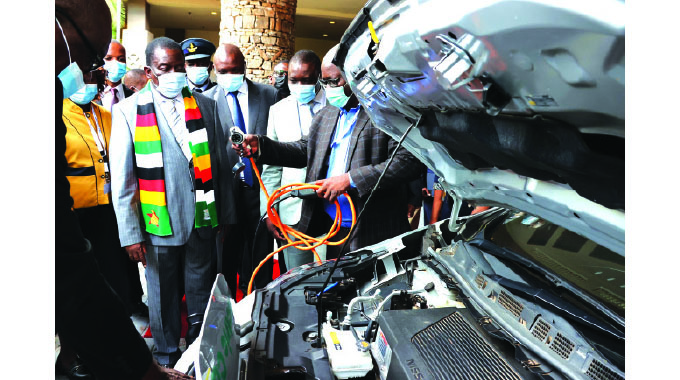President unhappy with gas licensees

Victoria Falls Bureau
Delays by some investors in implementing projects for renewable or lower carbon energy are potentially hampering Zimbabwe’s progress despite the investors being awarded special permits by the Government, the President has said.
He told delegates at the 3rd International Renewable Energy Conference and Expo in Victoria Falls yesterday that Zimbabwe had vast investment opportunities in the clean energy sector, which were yet to be fully exploited.
These include vast deposits of coal bed methane, which is yet to be commercially exploited owing to lack of adequate quantification and processing capacity although one company is pushing ahead and expects to start test drilling in 2024.
Coal bed methane is still fossil carbon fuel, but when used in a power station, it generates electricity with less than half the carbon dioxide emissions as a similar coal station.
If there were assured supplies, the next power station could be gas rather than coal.
In Zimbabwe, coal-bed methane reserves are mainly found in the Lupane, Gwayi and Hwange areas and natural gas, which is largely methane once other gases have been separated out, is being explored in Muzarabani,
Harnessing opportunities from coal bed methane, solar, wind, biogas and hydro systems is, thus critical for Zimbabwe, as it diversifies its energy mix in the context of subdued domestic generation capacity and the need to enhance regional power supplies.
However, the President said he was dismayed by slow project implementation on such critical projects.
“Investment opportunities also exist through the exploitation of our vast reserves of coal bed methane and the natural gas, present especially here in Matabeleland North Province as well as in Mashonaland Central Province,” said President Mnangagwa.
“I’m disappointed that there is a long list of companies given grants but are not found on the ground. In this regard, I exhort those with special grants to expedite the quantification and extraction of coal bed methane for the production of clean energy.
“It’s also disheartening that a number of licensed renewable energy independent power producers are taking too long to set up shop. The necessary modalities must be improved to ensure that licensed power projects are quickly implemented. Otherwise we shall be forced to give regulations that demand time lines of implementation.”
In keeping with global energy infrastructure trends, President Mnangagwa said his Government was keen to adopt new energy systems in line with the country’s climate change adaptation commitments.
He commended the commitment by the African Development Bank and the World Bank, in particular, in assisting the country to implement the renewable energy policy.
“Easy and equal access to the Green Energy Fund, in order to accelerate the adoption and urgent implementation of renewable energy projects remains key,” said President Mnangagwa.
“At the regional level, the launch of the Green Hydrogen Atlas for Southern Africa is a notable development, especially in relation to the use of green hydrogen in fertiliser manufacturing, the transport sector and power generation in general.”
The President appealed to potential partners to invest in the local production of renewable energy solutions and products such as solar water heaters, solar panels and energy storage equipment like lithium batteries.
He also challenged the country’s universities to play ball in unlocking the energy transition by developing new and innovative technologies of energy supply, through their innovation hubs and industrial parks.
“My expectation is that after this conference, more projects will be implemented, towards Zimbabwe becoming a net exporter of energy into the region,” said President Mnangagwa.
“Working together, we will achieve energy security, which is critical for economic stability and growth.”
The President urged the media to play its part in disseminating information on pertinent issues that drive the national development agenda and promote a higher quality of life for all people.
“This must include information relating to climate change and the sustainable generation and use of renewable energy, towards a ‘Net Zero Country’ and indeed a ‘Net Zero Africa,’” he said.











Comments